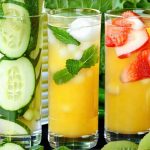Constipation is a surprisingly common digestive issue affecting people of all ages, often dismissed as merely uncomfortable when it can significantly impact quality of life. It’s characterized by infrequent bowel movements or difficulty passing stool, but the experience itself is highly individual; what feels constipated to one person might not bother another. Many factors contribute to constipation, ranging from dietary habits and lack of physical activity to underlying medical conditions and medication side effects. However, a frequently overlooked element in this complex equation is insufficient hydration, particularly when coupled with a diet lacking naturally hydrating vegetables. We often think about drinking enough water, but the source of that hydration – food included – plays a crucial role in maintaining healthy bowel function.
The modern Western diet tends to prioritize processed foods and refined carbohydrates over whole, nutrient-rich options, leading to lower fiber intake and reduced water content overall. This is compounded by busy lifestyles which often result in less mindful eating habits and decreased consumption of fresh produce. When vegetable intake is minimal – and even more so when those vegetables aren’t the types known for high water content – the body struggles to create stool that is soft and easily passed, leading to harder, drier stools and ultimately, constipation. This isn’t just about drinking eight glasses of water a day; it’s about establishing a holistic approach to hydration through both liquids and food choices. If mild constipation persists, consider when mild constipation needs advanced testing.
The Role of Hydrating Vegetables in Digestive Health
Vegetables aren’t simply sources of vitamins and minerals; they are also significant contributors to our daily fluid intake. Many vegetables boast incredibly high water content – think cucumbers (96% water), lettuce (95%), celery (95%), zucchini (95%), and tomatoes (94%). These foods deliver hydration alongside essential nutrients, making them far more effective than simply drinking plain water in some cases. Water is critical for softening stool, allowing it to move smoothly through the digestive tract. Without adequate hydration, the colon absorbs more water from the stool, resulting in harder, drier masses that are difficult and painful to eliminate. A diet severely lacking these hydrating vegetables forces the body to rely almost entirely on beverages for fluid intake, which can be insufficient or easily neglected during busy periods. Understanding hidden gut issues revealed by advanced scan layers could also help pinpoint underlying causes.
Furthermore, the fiber content of many hydrating vegetables contributes directly to healthy bowel movements. Fiber adds bulk to stool, stimulating peristalsis – the wave-like muscle contractions that move waste through the intestines. Soluble fiber, found in vegetables like okra and Brussels sprouts, absorbs water, further softening stools. Insoluble fiber, prevalent in leafy greens and root vegetables, provides bulk and speeds up transit time. The combination of these two types of fiber, coupled with high water content, is a powerful formula for preventing constipation. When vegetable consumption dwindles, so too does this critical fiber-water synergy. For those experiencing chronic issues, tests that help doctors understand chronic constipation can provide valuable insights.
The impact extends beyond just the mechanics of stool formation. Chronic dehydration caused by insufficient fluid intake – and exacerbated by a lack of hydrating vegetables – can also impair digestive function overall. It can lead to slower gastric emptying (the rate at which food leaves the stomach), reduced intestinal motility, and even alterations in gut bacteria composition, all contributing to constipation and other digestive issues like bloating and abdominal discomfort. Prioritizing hydrating vegetables is therefore a proactive step towards maintaining a healthy and efficient digestive system. Consider approaches to testing when constipation is intermittent if symptoms are unpredictable.
Understanding Low-Water Vegetables & Their Impact
While many vegetables are excellent sources of hydration, others contain relatively little water. These low-water vegetables – such as potatoes (around 77% water), corn (71%), and even some types of winter squash (around 90%, but often consumed in smaller quantities) – don’t contribute significantly to daily fluid intake. This isn’t to say these vegetables are unhealthy; they provide valuable nutrients. However, relying heavily on them while neglecting hydrating options like cucumbers, lettuce, or celery can inadvertently worsen constipation.
The problem is amplified when these low-water vegetables are combined with a generally low overall fluid intake and limited consumption of other hydrating foods. The body then faces a double whammy – insufficient water from both beverages and food sources. This forces the colon to work harder, absorbing more water from the stool in an attempt to maintain hydration levels, ultimately leading to harder stools and difficulty passing them. It’s also important to note that cooking methods can affect vegetable water content; boiling can leach out some nutrients and reduce overall hydration.
- Focus on consuming a variety of vegetables, prioritizing those with high water content whenever possible.
- Be mindful of portion sizes: even hydrating vegetables need to be eaten in sufficient quantities to make a difference.
- Consider incorporating raw or lightly steamed hydrating vegetables into your diet to preserve their water content and nutritional value.
The Connection Between Vegetable Intake & Gut Microbiome Health
The gut microbiome – the vast community of bacteria residing in our digestive tract – plays an increasingly recognized role in overall health, including bowel regularity. Fiber from vegetables acts as prebiotic food for these beneficial bacteria, promoting their growth and diversity. A healthy and diverse microbiome is essential for efficient digestion, nutrient absorption, and immune function.
When vegetable intake is low, the gut microbiome suffers. Without sufficient prebiotic fiber, beneficial bacteria populations dwindle, allowing potentially harmful bacteria to flourish. This imbalance – known as dysbiosis – can disrupt digestive processes, leading to inflammation, reduced motility, and ultimately, constipation. Hydrating vegetables are particularly beneficial because they combine both fiber and water, creating an ideal environment for a thriving microbiome.
The gut microbiome also influences the production of short-chain fatty acids (SCFAs) through fermentation of dietary fiber. SCFAs like butyrate have anti-inflammatory properties and can stimulate intestinal muscle contractions, aiding in bowel movements. A lack of vegetable intake compromises SCFA production, further exacerbating constipation and potentially leading to other health issues. In some cases, which digestive tests are covered by insurance can help determine the best course of action.
Practical Strategies for Increasing Hydrating Vegetable Consumption
The good news is that incorporating more hydrating vegetables into your diet doesn’t require drastic changes or restrictive diets. Small, sustainable adjustments can yield significant benefits. One simple strategy is to start each meal with a side salad featuring lettuce, cucumbers, and tomatoes. Snack on celery sticks with hummus, or add sliced cucumber to sandwiches and wraps.
- Hydration Boosters: Add watercress to salads; it’s exceptionally hydrating.
- Smoothie Power: Blend spinach or kale into smoothies for a hidden hydration boost (and added nutrients).
- Soup It Up: Incorporate zucchini, celery, and tomatoes into soups and stews.
Another effective approach is to plan your meals around vegetables rather than meat. This encourages creativity and ensures that vegetables are the star of the show. Experiment with different recipes and cooking methods to find hydrating vegetable options you genuinely enjoy. Don’t underestimate the power of convenience; pre-cut vegetables or frozen varieties can make it easier to incorporate them into busy schedules. Finally, remember that hydration isn’t just about what you eat – adequate water intake remains crucial, but pairing it with a diet rich in hydrating vegetables is the most effective approach for preventing and relieving constipation. Remember to listen to your body and adjust your dietary habits based on individual needs and preferences. To optimize digestion, consider food density principles for minimal gas output. Also explore bloat-free food combinations inspired by traditional cultures to minimize discomfort.


















